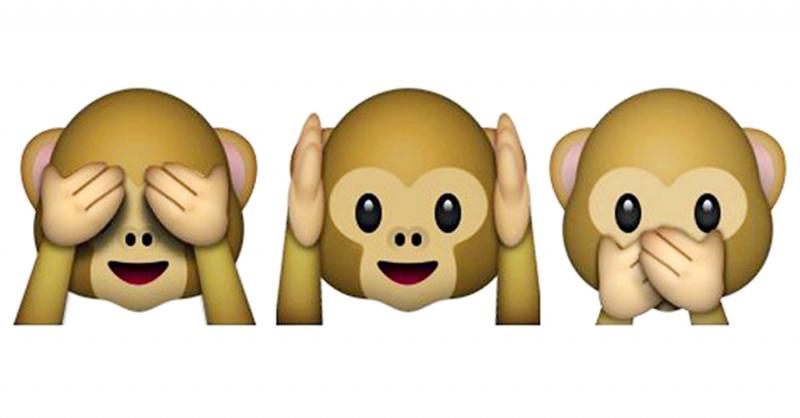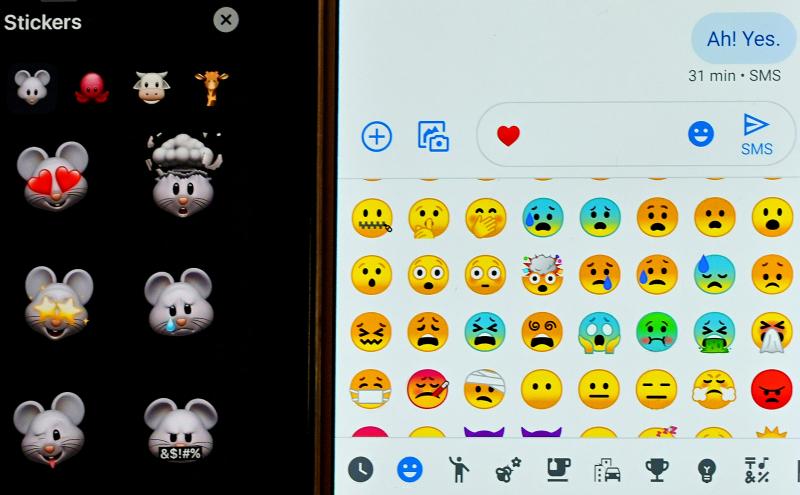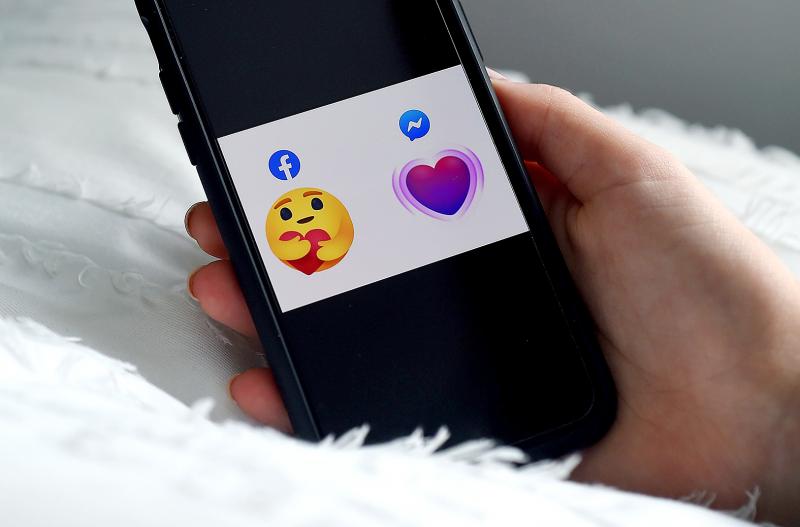It’s 2021, and despite some great advances in space exploration, we are no closer to really knowing whether men are from Mars and women are from Venus. In fact, the growing consensus is that we’re all from Earth, and people are more complex than we usually give them credit for.
But what if there were a way of unlocking some of the hidden trends that exist among men and women, which reveal how they think, see themselves and communicate? And what if it were ... emojis?
A lot has been written on the so-called war between millennials and Gen Z and how they use emojis. According to the latest reports, the cry-laughing emoji is passe among zoomers, who prefer to use the skull and crossbones symbol to convey that they are literally (but not literally-literally) dead.

Photo courtesy of wikimedia commons
But while this generational war is mostly overblown, there are some marked differences in how men and women use emojis, as evidenced by recent studies analyzing millions of messages between them.
Research has shown that there are broad but clear differences in emoji usage between genders. For example, when was the last time you saw a woman use the monkey emoji ? A favorite among men who’ve just embarrassed themselves, it may be one of the most divisive out there.
One Twitter user jokingly asked “should men who use the monkey emoji have rights? be honest.” It received 18,000 retweets.

Photo: AFP
Why does the monkey emoji resonate so strongly? And does it really open up a giant door into male psychology? Of course, we shouldn’t generalize. But in some cases, the answer seems to be ... yes, it does.
STOP EGGPLANTING
“Men are apologizing a lot,” says Max Alley, an online dating coach based in New York. He works with men and women on their dating profiles and messaging. A big part of his job is going through their chat logs and figuring out where his clients have gone wrong.

Photo: AFP
Often, emojis play a central role.
According to Alley, the biggest mistake straight men make with emojis is the same as their biggest mistake overall: being far too direct or inappropriate.
“The eggplant emoji is the stupidest thing any any man could ever send to a woman,” says Alley. “But they do.” He says men will also use the purple devil emoji in a sexual way with women they barely know. And they’ll try to make it more palatable with the sweating-while-smiling emoji, which shows that they’re being inappropriate, but also aware of the fact they’re being inappropriate.
Amie Leadingham, a dating coach based in Los Angeles, says she sees this too. “Men get too direct too quickly,” she says. “They assume the person is ready to meet them already, and ready to like them. It can really be a big turnoff for women. The easiest dating secret in the world is make the person feel like they’re the most important person in the room, you know?”
More often than not this causes a very awkward situation — and this is where the monkey emoji comes in. “It’s like a facepalm but it’s meant to soften the blow a little bit,” says Alley. “To be like, I’m sorry, I messed up, but I’m still cute, though, right?”
Leadingham says she has seen all the different monkey emojis appear frequently in the messages her female clients have received. “Any of the evil monkeys, yeah,” she says. “And then there’s another one where the emoji has pink cheeks and big eyes like they’re embarrassed for you. Oh, wow. Those are not good.”
But is it only the men making people feel uncomfortable? According to both coaches, the answer seems to be yes a lot of the time — but not always. “Honestly, some of my male clients get some weird stuff [from women] too,” Leadingham tells me. The biggest mistake women make, in her experience, is overexposing themselves in a different way. You could call it “emotional eggplanting.”
In her experience, if a female client does make a mistake, it’s making themselves too vulnerable too soon. “Those are massive red flags, as vulnerability is great but with boundaries, right? They may tell you their life story, and with a lot of drama tied to it. And they’re just dumping it on you.”
In the same way that men then resort to emojis when they realize they’ve been too forward, Leadingham says that women will also express their embarrassment in the easiest way possible and rely on images to convey how they feel, rather than typing it out. In this way, emojis can be a crutch that helps avoid further displays of vulnerability, or at least soften them. She says common emojis women will use if they feel like they’ve said too much include the blushing face, the zippered mouth, and the sad downtrodden one — especially if it’s led to them being ghosted.
Alley also works with women, and says their big mistake in online dating is leading a guy on who is not worth their time. What this means is that women may not realize just how sexually driven the man they’re talking to is. They may use mildly flirty emojis without realizing that the man is interpreting them differently.
This may sound like victim-blaming, but obviously the onus is on men to be better at reading the room, so that mildly flirty emojis can just be that — mildly flirty — and not trigger a barrage of purple eggplants, devil faces or, God forbid, actual real penises.
WOMEN KNOW BETTER?
There are also differences between men and women’s emojis that aren’t quite as awkward. Alley very rarely sees straight men using Bitmoji, which allows you to create a cartoon version of yourself, whereas it’s much more popular among women and gay men. And when it comes to his older clients he says emoji use is far more limited to simple smileys, or not used at all.
There are also big differences over repetition and emphasis. “Men will react with the fire emoji pretty frequently to show excitement,” says Alley. “They’ll also use it multiple times, so it’s like, double or triple fire.” Meanwhile, the women he’s worked with are more likely to use hearts and sparkles to convey positivity, and “find images that pair well together to make a statement from it, while men will often amplify the emotion of their statement by just tripling the emoji.”
Academic studies have made very similar findings. They’ve found that women use emojis more than men, are more likely to pair sports emojis with baths and showers (vs men who pair them with trophies) and generally have a better knowledge of their different meanings.
In 2018, researchers from Peking University and the University of Michigan were the first to undertake a large-scale analysis of emojis and gender. They looked at 134,000 anonymous Android users from 183 countries, who produced 401 million messages over three months in 58 languages. It was limited due to the fact that it only looked at men and women (rather than being inclusive of all gender identities), but it still threw up some fascinating results.
Chiming with Alley’s observation, the study found that “female users are more likely to use only one emoji or discretely use multiple emojis in a message, [whereas] male users are more likely to consecutively use multiple emojis.” It also discovered that compared to men, women are more likely to elongate their words to convey heightened emotion and say things such as “coooooooooooooolllll!”
And then there are emoji users who do not claim a specific gender as their identity. “Past research has been limited to the gender-binary population,” says Sanjaya Wijeratne, a research scientist at the visual messaging app Holler.io who wrote his PhD on emojis.
Given that gender identities exist on a wide spectrum, can emojis help us better understand their various shades? It may be difficult, as the trends between men and women so far seem influenced by traditional notions of gender. In a 2018 study on how people interpret emojis, those who marked their gender as “other” had more differences from the male and female participants than the men and women had between themselves.
While many of the paper’s findings broadly aligned with stereotypical notions of gender, some of them didn’t at all.
“We are surprised to find that male users are significantly more likely to use heart-related emojis than females,” the researchers write. “This is contrary to psychological literature where males are reported to be less willing to express love in real life. Such a finding implies that although men reserve to express their love in real life, they are more willing to express love through emojis in textual communication.”
The paper also found that the 10 most popular emojis among women and men are almost exactly the same, but with one exception: that cheeky, embarrassed, kind of creepy, why-did-you-just-say-that monkey.

No one saw it coming. Everyone — including the Chinese Nationalist Party (KMT) — expected at least some of the recall campaigns against 24 of its lawmakers and Hsinchu Mayor Ann Kao (高虹安) to succeed. Underground gamblers reportedly expected between five and eight lawmakers to lose their jobs. All of this analysis made sense, but contained a fatal flaw. The record of the recall campaigns, the collapse of the KMT-led recalls, and polling data all pointed to enthusiastic high turnout in support of the recall campaigns, and that those against the recalls were unenthusiastic and far less likely to vote. That

Behind a car repair business on a nondescript Thai street are the cherished pets of a rising TikTok animal influencer: two lions and a 200-kilogram lion-tiger hybrid called “Big George.” Lion ownership is legal in Thailand, and Tharnuwarht Plengkemratch is an enthusiastic advocate, posting updates on his feline companions to nearly three million followers. “They’re playful and affectionate, just like dogs or cats,” he said from inside their cage complex at his home in the northern city of Chiang Mai. Thailand’s captive lion population has exploded in recent years, with nearly 500 registered in zoos, breeding farms, petting cafes and homes. Experts warn the

A couple of weeks ago the parties aligned with the People’s Republic of China (PRC), the Chinese Nationalist Party (KMT) and the Taiwan People’s Party (TPP), voted in the legislature to eliminate the subsidy that enables Taiwan Power Co (Taipower) to keep up with its burgeoning debt, and instead pay for universal cash handouts worth NT$10,000. The subsidy would have been NT$100 billion, while the cash handout had a budget of NT$235 billion. The bill mandates that the cash payments must be completed by Oct. 31 of this year. The changes were part of the overall NT$545 billion budget approved

The unexpected collapse of the recall campaigns is being viewed through many lenses, most of them skewed and self-absorbed. The international media unsurprisingly focuses on what they perceive as the message that Taiwanese voters were sending in the failure of the mass recall, especially to China, the US and to friendly Western nations. This made some sense prior to early last month. One of the main arguments used by recall campaigners for recalling Chinese Nationalist Party (KMT) lawmakers was that they were too pro-China, and by extension not to be trusted with defending the nation. Also by extension, that argument could be